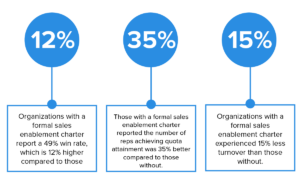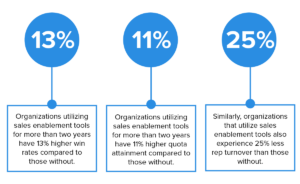The phrase “if you’re not early, you’re late” is one of the most familiar pieces of advice passed down from generation to generation and mentor to mentee. So much so that the phrase has over 1.4 billion search results on Google — which is understandable when you consider how often the advice is applicable. From job interviews to product differentiation, it’s always beneficial to stay ahead of the competition.
Sales Enablement PRO recently published the 2019 State of Sales Enablement and the report clearly echoed a similar sentiment — companies without an established sales enablement function are behind the curve and risk falling prey to their competitors.
Sellers Carry a Heavy Burden
The report found that organizations with more formal approaches to sales enablement performed better than those without one. These companies saw increased win rates, quota attainment, seller retention, and collaboration after establishing their formal sales enablement program.

Today’s sellers are burdened with navigating more demanding buyers and more complex sales cycles. More than half of this year’s respondents (51%) said that they noticed buyers conduct more research prior to engaging sellers and 46% believe buyers have an increased expectation of value-added insight.
If sales reps hope to remain competitive in this new landscape, they must capitalize on every buyer conversation and artfully approach each exchange. They also have to be industry, product, and buyer persona experts. This means staying up-to-date on product information, new messaging, and new features and functionality. It’s no wonder that 66% of a sales reps’ time is spent on non-selling tasks, rather than on building new customer relationships or closing deals.
Sellers need compelling content to connect with today’s more educated buyers and move them through the buyer’s journey. Sellers can’t bear this burden alone, though.
That’s where sales enablement comes in.
Sales Enablement Tools Expedite Effectiveness
As sales reps juggle increased buyer expectations and more complicated sales cycles, they need technology that will make their lives easier. Sales enablement technology gives sellers the guidance, content, and context they need to move buyers through the funnel more effectively. Today’s buyers are no longer waiting to be educated by sellers. Instead, they are doing their homework and expect sellers to be prepared when they are ready to engage. It comes as no surprise 74% of buyers choose the sales rep that was first to add value and insight. This has made content the center of the sales conversation.
Reps can use sales enablement technology to quickly find the most effective and top recommended content so they spend less time searching and more time selling. The key is AI-powered sales guidance embedded in reps’ existing workflow that puts all relevant content, training, and tools at their fingertips and in context, making it easy to have effective sales conversations. Ultimately, reps put their best foot forward and buyers have a better experience.
The report also found that while a formal sales enablement program itself can increase sales productivity, there is a first-mover advantage with companies that have used sales enablement for more than two years experiencing 13% higher win rates and 11% higher quota attainment.

Organizations that have yet to adopt sales enablement are not only behind the curve — they are trailing their competitors. Today’s sellers need sales enablement to win over their buyers. Without it, they’re already late and only falling further behind.




